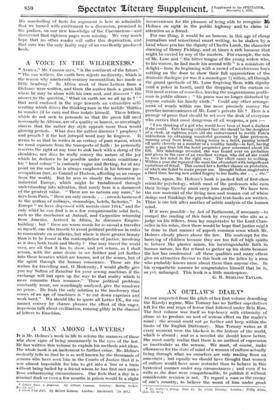A VOICE IN. THE WILDERNESS.*
" AFRICA," Mr. Carman says, " is the continent of the future." " The sun withers, the earth here rejects mediocrity, which is the reason why nineteenth-century mercantilism has made so little headway." In Africa most of these Letters from a Distance were written, and there the author finds a green hill where he may be alone with his own soul, and discover " the answer to the question, What on earth are we all up to ? ' " that need enclosed in the urge towards an exhaustive self- scrutiny which drives the thinking man in the middle 'thirties to wander (if he can) and thus isolate himself. These letters, which do not seek to persuade us that the green hill need necessarily be African, are of a quality so honest, so arrestingly sincere that the rather dry style appeals more than would glowing periods. What does the author discover ? prophesy ? and preach ? if the last intrepid word may be forgiven. It seems to us that he writes in an ecstasy of pure reason, which we must separate from the transports of faith : he personally reserves the right at any time to sink back with a shrug of the shoulders, nor does he really convey the nature of the joy which he declares to be possible under certain conditions ; his " local colour " is curiously vague and fleeting, for at any point on the earth he is always ensphered in his intense pre- occupations (not, as Conrad or Hudson, affording us an escape from the world). But he sees so clearly the damnation in industrial Europe, which might be transformed through understanding into salvation, that surely here is a document of the greatest value. " There are no nations any more," he says from Paris, " there are only crowds . . . crowds harnessed to the system of railways, steamships, hotels, factories." In Europe " we have dispensed with morals since 1014," and the only relief he can find is in a few companionable solid facts, such as the racehorses at Auteuil, and Carpentier returning from America. Arrived in Africa, he discusses Empire- building : but " these arc warm words for so casual a traveller as myself, one who travels to avoid political problems in order to concentrate on aesthetics, but where is there greater beauty than is to be found in the contemplation of justice, involving as it does both truth and liberty ? One may travel the world over, see all that it has to show, and yet return, as I shall return, with the same desire to see further and yet further Into those beauties which are known, not of the senses, but of the spirit through the human conscience. Those are the realms for travelling and, 0 Modernity, I would gladly give you my Sultan of Zanzibar for your sewing machines if the exchange will but open up the way to that reality which is more romantic than romance." These political problems constantly recur, are searchingly analysed, give the wanderer no peace. He finds the only solution to the insolvency that comes of an age of machines is " to cut down expenses and work hard." We should like to quote all Letter IX., for one cannot convey by chance phrases the effect of this eager, imperious talk about civilization, running glibly in the channel of letters to Eusebius.


























































 Previous page
Previous page